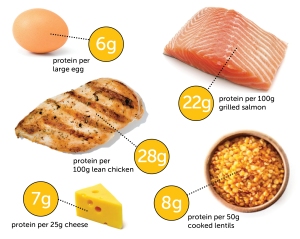Are you receiving your Recommended Daily Intake of protein? What is the RDI for protein? Protein for weightloss? Protein for Muscle gain?
Did you know that protein makes up about half of the human body’s dry weight? Many of the foods we eat contain protein; particularly flesh foods (chicken, beef, lamb and fish) and legumes. Proteins are digested to release amino acids. In the body, amino acids are used to make new proteins, converted into hormones such as adrenalin or may be used as an energy source. (1)
Benefits of protein such as;
- Growth development
- Muscle growth
- Hair, skin and nail growth
- Muscle repair
- Aid in healing wounds and scars
- Replenishment of lost blood
So are we consuming enough protein in our diets?
Most Australians eat far more protein than they actually need, so deficiencies are rare. The amount of protein you need in your diet depends on your weight, age and health. As a rough guide, the recommended dietary intake (RDI) for protein (measured in grams per kilogram of bodyweight) is:
- 0.75 g/kg for adult women
- 0.84 g/kg for adult men
- Around 1 g/kg for pregnant and breastfeeding women, and for men and women over 70 years.
So, for example, a 75 kg adult male would need 63 g of protein per day. It is recommended that 15 to 25 per cent of total energy intake per day is from protein sources. (1)
| Group | Protein intake (g/kg/day) |
| Sedentary men | 0.8-1.0 |
| Elite male endurance athletes | 1.6 |
| Moderate-intensity endurance athletes (a) | 1.2 |
| Recreational endurance athletes (b) | 0.8-1.0 |
| Football, power sports | 1.4-1.7 |
| Resistance athletes (early training) | 1.5-1.7 |
| Resistance athletes (steady state) | 1.0-1.2 |
| **Female athletes | ~15% lower than male athletes |
(a) Exercising approximately four to five times per week for 45-60 min
(b) Exercising four to five times per week for 30 min at <55% VO2peak
Above is a table from The Australian Institute of sport (3)
Protein and weightloss
A diet that involves an increase of protein is becoming more and more common these days. A protein diet consists of 60-65% of carbohydrates, 25-30% of protein and 15-20% or fats. Now 30 percent may seem a bit high but now it is regarded as ‘reasonable’ and a 50% protein diet is considered high as there are claims it could potentially cause more harm than good.
Some reasons why you should increase your protein if your goal is to lose weight
1. Increased Thermic Effect of Feeding
All macronutrients require metabolic processing for digestion, absorption, and storage or oxidation, the thermic effect of protein is significantly higher than carbs and fat. In fact, protein requires 25-30% of the energy it provides just for digestion, absorption, and assimilation while carbs only require 6-8% and fat requires 2-3%. Eating protein is actually thermo-genic and can lead to a higher metabolic rate. This means greater fat loss when dieting and less fat gain during hypercaloric diets. (2)
2. Increased Glucagon — Protein consumption increases plasma concentrations of the hormone glucagon. Glucagon is responsible for antagonizing the effects of insulin in adipose tissue, leading to greater fat mobilization. In addition, glucagon also decreases the amounts and activities of the enzymes responsible for making and storing fat in adipose and liver cells. Again, this leads to greater fat loss during dieting and less fat gain during overfeeding. (2)
The optimal time for consuming protein is as soon as possible after exercising (either resistance or aerobic), it is recommended consuming a high-quality protein source (such as a glass of milk or tub of yoghurt) combined with a carbohydrate meal to help positive protein balance. Studies have shown this to be beneficial for maintaining protein balance even when following low to moderate aerobic exercise (such as walking), particularly for older adults.
Protein and Muscle gain
Contrary to popular belief, people who exercise vigorously or are trying to put on muscle mass do not need to consume extra protein. Studies show that weight-trainers who do not eat extra protein (either in food or protein powders) still gain muscle at the same rate as weight-trainers who supplement their diets with protein. (1)
From my experience in professional sports I believe that it is important to increase you protein intake as when you are training intensely protein aids in the repair of the muscles that have been damaged in your previous workout. Also if you are just relying on your RDI to get the protein while you are training you may be missing out on the benefits mentioned above.
So yes, If you are training intensely you will require additional protein in your diet to both repair and grow muscle. Especially if you are training at a high intensity 4-5 times a week there is not sufficient recovery time for you muscles to repair and then work at full capability.
Reference;
1) http://www.betterhealth.vic.gov.au/bhcv2/bhcarticles.nsf/pages/protein?open
2) http://jasonferruggia.com/why-you-may-need-to-eat-more-protein/
3) http://www.ausport.gov.au/ais/nutrition/factsheets/basics/protein_-_how_much



Reblogged this on The Food Life and commented:
Lots of great facts to consider when planning your meals specific to your goals Great article Bradley!
Very interesting. I’m thinking of doing a nutrition course to learn this sort of info so I was really happy to see this post.
Great article. I worry about my protein intake, being a vegetarian, and I’m constantly seeking ways to increase my intake.
This is a great article – very informative! I do take a protein supplement after my workouts. I use it as my afternoon snack and to keep me from snacking before dinner.
This is a fascinating topic! As an amateur athlete I’m particularly interested.